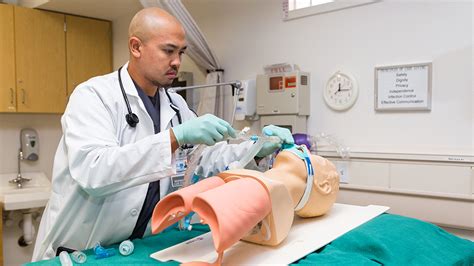As the world continues to grapple with the challenges of healthcare, the demand for skilled professionals in the medical field has never been more pressing. Among the many vital roles that contribute to the smooth functioning of healthcare systems, the Respiratory Therapist Technician (RTT) plays a crucial part in ensuring patients with breathing difficulties receive the care they need. In this comprehensive guide, we will delve into the world of Respiratory Therapist Technicians, exploring what this career entails, the requirements for entry, and the rewarding aspects of this vital profession.
What is a Respiratory Therapist Technician?

A Respiratory Therapist Technician is a healthcare professional trained to work under the supervision of a Respiratory Therapist (RT) or a physician to provide respiratory care to patients with breathing disorders or cardiopulmonary diseases. Their role is crucial in assessing, treating, and educating patients with respiratory issues, making them an integral part of the healthcare team.
Responsibilities of a Respiratory Therapist Technician
- Assessment and Monitoring: RTTs are involved in assessing patients' respiratory status, monitoring their progress, and reporting any changes to the supervising RT or physician.
- Therapy Administration: They administer various respiratory therapies, including oxygen therapy, aerosol therapy, and chest physiotherapy, as prescribed by a physician.
- Equipment Management: RTTs are responsible for the maintenance and operation of respiratory equipment, ensuring it is in good working order and available when needed.
- Patient Education: Educating patients and their families on how to use respiratory equipment, understand their respiratory conditions, and manage their care at home is a key part of the RTT's role.
Skills Required for a Respiratory Therapist Technician

- Technical Skills: Proficiency in the use of respiratory equipment and technology is essential.
- Communication Skills: RTTs must be able to communicate effectively with patients, families, and other healthcare professionals.
- Critical Thinking: The ability to assess situations, make judgments, and take appropriate actions is critical.
- Physical Stamina: The job can be physically demanding, requiring long periods of standing, lifting, and moving equipment.
Education and Training for Respiratory Therapist Technicians
The typical pathway to becoming an RTT involves post-secondary education and clinical training. Most RTTs complete an associate's degree program in respiratory therapy technology or a related field, which includes classroom instruction and clinical practice. These programs are usually accredited by the Commission on Accreditation for Respiratory Care (CoARC).
Certification and Licensure

- Certification: Upon completing their education, aspiring RTTs can obtain certification from the National Board for Respiratory Care (NBRC) by passing the Certified Respiratory Therapist (CRT) exam, leading to the Certified Respiratory Therapist (CRT) credential.
- Licensure: While not all states require licensure to practice as an RTT, having a state license can be advantageous for career advancement and mobility.
Career Outlook and Salary
The demand for skilled healthcare professionals, including RTTs, is on the rise, driven by an aging population and an increase in respiratory conditions such as asthma and COPD. According to the Bureau of Labor Statistics (BLS), employment of respiratory therapists and technicians is projected to grow significantly through the next decade.
Salaries for RTTs can vary based on location, employer, level of experience, and certification. On average, RTTs can expect a salary range that reflects their importance in the healthcare team.
Gallery of Respiratory Therapist Technician Career






Frequently Asked Questions
What does a Respiratory Therapist Technician do?
+A Respiratory Therapist Technician works under the supervision of a Respiratory Therapist or physician to provide respiratory care to patients with breathing disorders or cardiopulmonary diseases.
How do I become a Respiratory Therapist Technician?
+Become a Respiratory Therapist Technician by completing an associate's degree program in respiratory therapy technology and obtaining certification from the National Board for Respiratory Care (NBRC).
What are the benefits of being a Respiratory Therapist Technician?
+Being a Respiratory Therapist Technician offers personal satisfaction from helping patients, job security, and opportunities for career advancement.
In conclusion, the role of a Respiratory Therapist Technician is vital to the healthcare system, offering a rewarding career path for those who are passionate about delivering quality patient care and making a difference in people's lives. Whether you're just starting out or looking for a career change, considering the path of a Respiratory Therapist Technician can be a fulfilling choice.
If you found this guide informative and helpful, please share it with others who might be interested in this career path. Your thoughts and questions are welcome in the comments section below.
